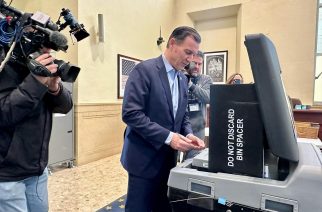
Gov. Andrew Cuomo, Senate Majority Leader John Flanagan, Senate Independent Democratic Conference Leader Jeffrey Klein, and Assembly Speaker Carl Heastie on Friday announced an agreement on a $153.1 billion budget for fiscal year 2017-2018.
State operating funds spending is $98.1 billion for the 2017-2018 fiscal year — an increase of 2 percent. State operating funds exclude federal funds and capital.
The budget increases education aid by $1.1 billion, including a $700 million increase in Foundation Aid, bringing the new education aid total to $25.8 billion, or an increase of 4.4 percent. It also increases Medicaid state share funding to $23.5 billion.
Highlights touted by the governor and legislative leaders include:
Reducing taxes to record lows for middle-class New Yorkers
The budget lowers the personal income tax rates for middle-class New Yorkers. With the middle class tax cuts of 2012, rates were lowered from 6.85 percent to 6.45 percent for taxpayers in the $40,000-$150,000 income bracket, and to 6.65 percent in the $150,000-$300,000 income bracket.
Under these new reforms, the rate will drop even further this year and will continue to drop all the way to 5.5 percent and 6 percent, respectively, when the cuts are fully phased in.
The Governor’s Office says these new lower tax rates will save middle class New Yorkers nearly $6.6 billion in just the first four years, with annual savings reaching $4.2 billion by 2025. As the new rates phase in, they will be the state’s lowest middle class tax rates in more than 70 years. When the tax cuts begin, they will benefit 4.4 million filers, growing to 6 million filers when fully phased in.
Investing record $25.8 billion in education
The new budget increases Education Aid by $1.1 billion, including a $700 million increase in Foundation Aid, bringing the new Education Aid total to $25.8 billion, or an increase of 4.4 percent.
Excelsior Scholarship Program
The budget enacts the governor’s landmark Excelsior Scholarship program which provides free tuition to families making up to $125,000 per year. Nearly 940,000 New York families are eligible for the program.
The new initiative will be phased in over three years, beginning for New Yorkers making up to $100,000 annually in the fall of 2017, increasing to $110,000 in 2018, and reaching $125,000 in 2019. The Excelsior Scholarship is a ‘last mile’ program, which extends the state’s existing aid programs, including the nearly $1 billion Tuition Assistance Program and any applicable federal grants, and fills in any remaining gaps to cover the full cost of tuition.
To qualify, New Yorkers must be enrolled in college full-time, averaging 30 credits per year and completing their degree on-time. The program includes built in flexibility, allowing students to pause and restart the program, due to a hardship, or take fewer credits one semester than another.
Students must also maintain a grade point average necessary for the successful completion of their coursework. Under the program, New Yorkers will be required to live and work in-state for the number of years they received the Excelsior Scholarship. The Budget also includes a “maintenance of effort” to assist in meeting the operational needs of SUNY and CUNY.
The budget also allocates $8 million to provide open educational resources, including electronic-books, to students at SUNY and CUNY. At the state’s direction, SUNY and CUNY will use this funding to target high-enrollment courses, including general education, to maximize student savings.
Under the FY 2018 Budget, a new Enhanced Tuition Award will also enable students attending private not-for-profit colleges to receive financial assistance to complete their college degree. The program provides a maximum award of $3,000, requires private colleges to provide a match and freeze student tuition for the duration of the award – maximizing the financial benefit to the student. The enacted budget includes $19 million for the program.
Enhancing the middle class Child Care Tax Credit
The budget enacts an enhanced middle class child care tax credit that will help more than 200,000 middle-class families make their child care more affordable. The new tax credit would supplement the current New York State Child and Dependent Care Tax Credit and more than double the benefit for families earning between $60,000 and $150,000, bringing the total credit from $169 to $376 per household on average.
Lowering the costs of prescription drugs
Under the FY 2018 Budget, New York is the first state in the nation to cap the growth of prescription drug spending in its Medicaid program, which has grown 25 percent over the past three years. The agreement provides the Department of Health with a range of tools to lower the cost of prescription drugs, including the ability to drive down the cost of certain drugs whose price is high relative to its therapeutic benefits. This agreement enables the Medicaid program to allocate more resources for other health services.
Combating the opioid epidemic
In 2016, the governor signed into law a plan to combat the heroin and opioid epidemic in New York state. The FY 2018 budget invests more than $200 million to support prevention, treatment and recovery programs targeted toward chemical dependency, residential service opportunities, and public awareness and education activities.
Raising the age of criminal responsibility
The FY 2018 state budget raises the age of criminal responsibility to 18-years-old and ensures that young people who commit non-violent crimes receive the intervention and evidence-based treatment they need. Until now, New York was one of only two states in the nation that automatically processed all 16- and 17-year-olds as adults in the criminal justice system, no matter their offense.
The new measures will be phased in over time, raising the age of juvenile delinquency from age 16- to 17-years-old beginning on October 1, 2018, and subsequently raising the age of criminal responsibility to 18-years-old on October 1, 2019.
Further, young people will no longer be housed in adult facilities or jails. Young people under the age of 18 will no longer be placed or held at Rikers Island in New York City no later than October 1, 2018.
They are to be placed in specialized juvenile detention facility certified by the New York City Administration for Children’s Services and the State’s Office of Children and Family Services, and in conjunction with the State’s Commission of Correction and the New York City Department of Corrections.
The state will also create a raise the age task force, with committee members designated by the governor. Additionally, individuals who have been crime-free for 10 years after serving a sentence will be able to apply for the sealing of previous criminal convictions.
Homelessness and increases access to affordable housing
The FY 2018 budget continues funding for the state’s $20 billion comprehensive, five-year plan for affordable and supportive housing to ensure New Yorkers who are homeless or at risk of homelessness have safe and secure housing. The budget includes $2.5 billion in funding to advance the creation of 100,000 new affordable and 6,000 supportive housing units.
Enacting “Affordable New York” Housing Program
Under the FY 2018 Budget, developers of new residential projects with 300 units or more in certain areas of Manhattan, Brooklyn and Queens will be eligible for a full property tax abatement for 35 years if the project creates a specific number of affordable rental units and meets newly established minimum construction wage requirements.
The units must remain affordable for 40 years. For all other affordable developments in New York City, the period of affordability and abatement eligibility would be tied to the number of affordable units. This new program will create an estimated 2,500 new units of affordable housing per year.
Indigent defense
To ensure fair and equal representation for all accused individuals, the FY 2018 budget includes resources to develop the framework through which the state will fund 100 percent of the costs necessary to extend the reforms provided for in the Hurrell-Harring settlement to all 62 counties in New York.
The provision of quality criminal defense by the government to individuals who cannot otherwise afford counsel is guaranteed under Gideon v. Wainwright.
In 2014, the state successfully negotiated an agreement in Hurrell-Harring et al. v. State of New York et al., a lawsuit filed against the state and five counties based upon an alleged failure to provide the necessary level of indigent defense services in those counties, to bring true reform to public defense systems that were failing.
Budget flexibility to react to potential losses in federal aid
Given the looming threats from Washington, the FY 2018 Budget provides flexibility for the state to adjust spending during the fiscal year to account for a significant loss of federal aid. If federal support is reduced by $850 million or more, the New York State Director of the Budget will develop a plan to make uniform spending reductions. This plan would take effect automatically unless the Legislature passes its own plan within 90 days.
Ride sharing across New York
The FY 2018 Budget authorizes Transportation Network Companies, such as Lyft and Uber, to operate across New York and creates uniform licensing standards. The Department of Motor Vehicles will have broad oversight of rideshare companies and will ensure compliance with all laws, rules, and regulations required as part of a TNC’s operational license.
TNC companies will be required to maintain minimum insurance coverage levels of $1.25 million while a TNC driver is traveling to pick up a passenger and until the drop-off is completed. The state will also establish minimum standards to ensure passenger safety, including mandatory background checks, ongoing monitoring for traffic safety, anti-discrimination protections, and zero-tolerance drug and alcohol policies.
The budget also establishes a statewide task force to study and deliver recommendations on accessibility needs to protect and provide transportation to vulnerable populations. Necessary workers’ compensation coverage will also be provided to rideshare drivers through enhancements to the “Black Car Fund.” Finally, a statewide board will be established to review the impact of this newly authorized industry across the state.
Clean drinking water
To ensure that current and future New Yorkers have access to clean water, the budget initiates the $2.5 billion Clean Water Infrastructure Act. This program aims to protect public health, safeguard the environment, and preserve the state’s water resources.
These funds will help local governments address water emergencies, pay for local infrastructure construction projects, underwrite land acquisition for source water protection, and investigate and mitigate emerging contaminants in drinking water. These projects will improve the quality and safety of municipal drinking water distribution, filtration systems, and wastewater treatment infrastructure.
Workers’ Compensation reform
The budget includes workers’ compensation reforms that the governor says will provide cost savings for businesses and better protections for injured workers.
The new reforms ensure that the most significantly injured workers have the right to be considered for lifetime benefits. The reforms will also ensure swift access to hearings for injured workers not receiving benefits, create a clear formulary for prescription drugs, and provide relief for first responders exposed to a traumatic event at work.
Other changes include establishing more definitive limits on caps and updating medical guidelines to reflect advances in modern medicine.
Increasing salaries for direct care workers
The budget includes a landmark agreement that will provide New York’s 120,000 direct care professionals with a 6.5 percent raise over the next two years. These increases will help state-funded non-profits that specialize in the care of developmentally disabled New Yorkers recruit and retain employees.










